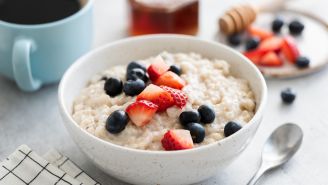Updated on July 15, 2025.
What's in fruit, veggies, and whole grains that keeps your GI system on track? Fiber, for one thing. But here's another: prebiotics.
Certain produce and grains are chock-full of the stuff. And that's a good thing, because prebiotics prompt the growth of healthy, keep-you-regular probiotic bacteria.
Gut-friendly foods
Bananas, berries, asparagus, garlic, wheat, oatmeal, barley, flaxseed, tomatoes, Jerusalem artichokes, onions, chicory, greens, and legumes (just to name a few!) all contain prebiotic carbohydrates—nondigestible fiber that sets the stage for beneficial probiotic bacteria. And that's something you definitely want, because probiotics do everything from protecting your bowels from toxins and infections to helping things move on through.
Digestive "dos"
Other things to help you stay regular:
- Fill up on fiber—at least 25 grams a day.
- Stay hydrated.
- Don't skip meals.
- Exercise! When your body moves, other things get moving, too.
Feeling sluggish? Read this article for more on keeping things moving along.
Medically reviewed in August 2019.






